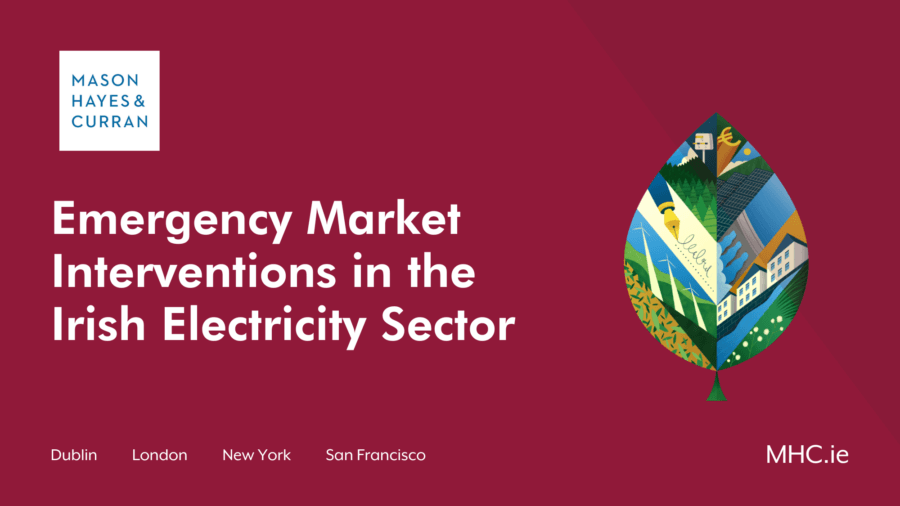
An EU regulation[1] relating to, by its own description, "an emergency intervention to address high energy prices", was adopted in October 2022 in response to the high prices witnessed in European wholesale electricity markets during 2022 (the Regulation). We discuss the measures by which it is anticipated that the Regulation will be implemented in Ireland. These include, most significantly, a "cap" on the revenues that may be earned by electricity generators using certain types of technology.
The scope of the Regulation
The preamble to Regulation sets out the background to the European measure, which relates generally to the disruption to the supply of natural gas and other fuels from Russia during 2022, and the consequent increase and volatility in the prices of electricity and other commodities across Europe.
The main elements of Regulation 2022/1854 are:
- A "mandatory cap" requiring that market revenues obtained from the generation of electricity from the following sources be capped to a maximum of €180/MWh of electricity produced: (a) wind; (b) solar; (c) geothermal; (d) hydropower (without reservoir); (e) biomass fuel (excluding bio-methane); (f) waste; (g) nuclear energy; (h) lignite; (i) crude petroleum products; and (j) peat; and
- A "temporary solidarity contribution" which will be applied to "surplus profits" generated from activities in the oil, gas, coal and refinery sector.
Despite the euphemistic language – "caps" and "contributions" – these are both, in substance, taxation measures that involve the confiscation by European governments of energy company revenues that have been designated politically as excessive. In the case of the market revenue cap, these are defined by reference to the per-MWh prices that prevailed in the relevant market. In the case of the solidarity contribution, these are taxable profits in the fiscal year 2022 and/or the fiscal year 2023 and for their full duration, which are above a 20 % increase of the average of the taxable profits in the four fiscal years starting on or after 1 January 2018 – and which will be subject to a levy at a rate of 75%.
National measures required for implementation in Ireland
The Regulation is a legal instrument that has binding force in the Member States of the European Union in accordance with its terms. However, because the Regulation is drafted at a general level, in practice it can only be implemented by way of detailed measures that need to be devised and applied in each Member State.
For Ireland, Minister Eamon Ryan announced in November last year that the market revenue cap in Ireland will apply to non-gas electricity generation with a capacity of 1MW or more, and will apply at the following wholesale electricity price levels:
- €120/MWh for wind and solar generation, and
- €180/MWh for oil-fired, coal-fired and other non-gas generation
An immediately noteworthy aspect of the proposal is that the €120/MWh cap proposed for wind and solar generation is considerably lower than the €180/MWh cap that is referred to in the Regulation . Indeed, in Ireland, the €180/MWh cap will only apply to generators that use oil, coal or certain other non-gas fuels. To this extent, the proposed Irish measure does not have the "cover" of European legislation.
Although the market revenue cap provisions of the Regulation took effect on 1 December 2022, as at the time of writing the cap has not yet been implemented in Ireland.
What we expect
We understand that:
- The Department of the Environment, Climate and Communications (DECC) is developing the measures with input from industry stakeholders, and is working towards the enactment of specific legislation.
- The proceeds of the cap will be used to lower electricity prices for consumers, although it has not yet been determined how this will done. It is not unreasonable to assume that the revenues will be used to fund the Irish government’s Electricity Costs Emergency Benefit Scheme II.
- Generators subject to the cap will be expected to self-declare their revenues and costs in two tranches (May 2023 and August 2023), before then being required to pay over any surplus revenues.
Contractual hedges
An area of particular complexity in the implementation of the cap is likely to be the treatment of contractual hedges, that have been entered into by market participants for the electricity that subsequently happens to receive above-cap spot market prices.
In its original November 2022 announcement, DECC acknowledged that the proceeds from these measures:
"… cannot be estimated with any certainty. Depending on the price level of natural gas, the proceeds could range from circa €300 million to €1.9 billion. However, the level is expected to be in the lower end of this range and could be even lower if gas prices reduce".[2]
Conclusion
The imposition of a revenue cap, involving the government confiscation of renewable generators’ electricity market proceeds in excess of a per-MWh limit, is an extraordinary measure that may well have unintended consequences for the future development of the Irish electricity generation fleet.
The Irish government has stated, in defence of the proposed €120/MWh cap, that it takes into account the fact that generators would not have expected to earn revenues in excess of €100/MWh prior to the natural gas price increases of 2022. However, the Irish electricity sector put considerable effort into the design of a revised wholesale market framework in 2018 that included much higher caps, and which did not explicitly foresee the intervention of government to manipulate these caps.
Now that politicians at European and Irish levels have shown an appetite to confiscate what are regarded as "surplus revenues", the developers and financiers of generation assets will have no choice but to factor this risk into decisions on how much capital should be invested in assets located in Ireland.
For more information and expert advice on the implementation of the measures in Ireland, contact a member of our Energy team.
The content of this article is provided for information purposes only and does not constitute legal or other advice.
[1] 2022/1854
[2] https://www.gov.ie/en/press-release/74f14-minister-ryan-announces-measures-to-address-windfall-gains-in-the-energy-sector/






